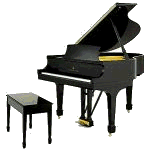

Composers from Amazon.com's Get Started in Classical:
| Bach | Glass | Schubert |
| Beethoven | Mahler | Stravinsky |
| Copland | Mozart | Tilson Thomas |
| Corigliano | Mutter | Wagner |
| Debussy | Pärt | Zimerman |
| NEW! Huang Additional composers and musicians |
||
Franz Schubert
This is from Amazon.com's Get Started in Classical.
Schubert's musical genius went well beyond his incomparable gift for melody
During Beethoven's funeral in 1827, one of the torchbearers was a young composer who would himself die the following year. There's a poignant irony in this image of Franz Schubert (1797-1828) paying homage to the master, for the extent of Schubert's own accomplishment was to remain one of music's best-kept secrets for decades after his death. He had indeed struck out on a uniquely personal creative path, however intense his hero worship of Beethoven was. As often happens in such periods of transition--in this case, the evolution in style and attitude from classical balance toward romantic experimentation--Schubert simply slipped through the cracks, not easily fitting into his contemporaries' sense of the direction music was taking.
Yet the fact that the only recognition that came his way was mostly confined to a tight-knit circle of musical friends didn't deter Schubert from pursuing his inspiration. Even though an astonishing number of compositions were never performed during his short lifetime, the prolific composer produced a wide body of material, all with a seemingly effortless swiftness reminiscent of Mozart (another of the composer's idols). His style is most frequently associated with an uncanny gift for melody, but that's a shortsighted view of the true nature of Schubert's genius.
The selections on our featured disc represent two key but divergent aspects of his music: the gemlike miniaturism of his songwriting and his preoccupation with large-scale forms from the classical period. "Die Forelle" ("The Trout")--sung here with a silvery, seductive grace by Barbara Bonney--is an example of how Schubert elevated the art of song to an opera in miniature, rich in evocative scene-painting. Pay attention not just to the beguiling melody but to how perfectly Schubert mirrors the text's images in the details of the burbling piano accompaniment.
The cheerful quintet that takes its name from the song makes an excellent introduction to the composer's longer works. Most of these belong to the realm of "chamber music"; that is, pieces written for small groups of musicians to be performed in people's homes. From the high-spirited interplay of the ensemble gathered here--all virtuosos on their respective instruments but clearly merging their voices into a common goal--it's easy to imagine a typical evening of Schubert making music with his friends. There's a flowing sense of conversation in the music, and just as you think you've heard one untoppable melody, Schubert obliges with another, taking it down an unexpected course with a sudden harmonic surprise--another of the composer's trademarks--and spinning it out as it suits his fancy. Schumann once characterized the composer's tendency to make us want the music to last, following its multiple digressions, as Schubert's "heavenly lengths."
Much of the pleasure here can also be heard in the way Schubert plays sonorities off each other, above all in the fourth movement. It offers a set of variations on the melody from the "Trout" song, presaging how Mahler would later incorporate material from his own songs into vast symphonic structures. You can notice this both in the interwoven yet contrasting timbres from the keyboard against four strings and in the opposition between double bass and sparkling passages high in the register. And within the spontaneity of the moment, there's something else: emerging within all the joie de vivre are ambivalent shadows hinting at Schubert's darker side, particularly in the intensity of the slow movement's middle core. This is also apparent in the opening of the "Arpeggione" Sonata (nicknamed after a short-lived invention that was a sort of cross between a guitar and a cello), which unfolds a kind of aching, spun-out lyricism that could belong to no one but Schubert.
In his final decade, when intense poverty and a debilitating case of syphilis began to take their toll, Schubert would mine this vein of profound self-expression. His last quartets and piano sonatas, the String Quintet, and his despairing song cycle Winterreise, he touches in his own way on the inwardness probed by Beethoven's late-period creations. Thomas May, Classical Editor
More Schubert can be found in Musical Information and Recommendations for Adults.
O'Connor Music Studio Recommendations
lists Books, CD's, Cassette Tapes, Computer Programs, Music Scores DVD's, Videos and more
from amazon.com, as well as several other sources.
 If you are looking for ideas for children's books, cd's, cassette tapes, computer
programs, games and toys, click here for some ideas.
If you are looking for ideas for children's books, cd's, cassette tapes, computer
programs, games and toys, click here for some ideas.
Many thanks to Dearest for everything!
is located
in Fairfax, Virginia
Over 30 Years
~~
Piano, Organ
Electric Keyboard
Accompanying
Email Mary O'Connor
All rights reserved.
Site design and maintenance by
O'Connor O'Riginals Web Design